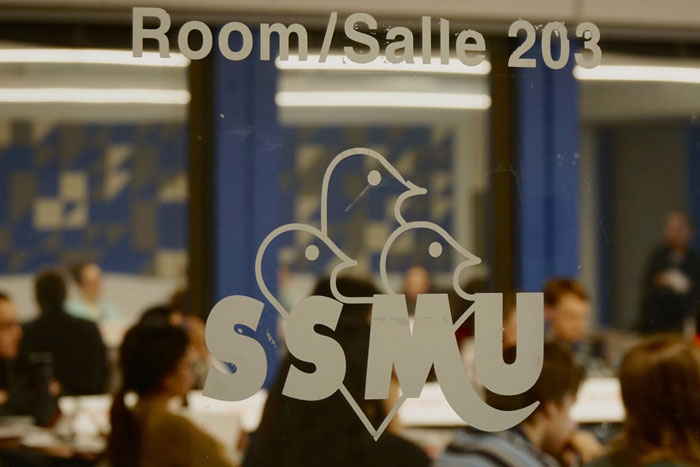At the Students’ Society of McGill University (SSMU) Legislative Council meeting on March 9, a lengthy question period took place due to the sudden resignation of former SSMU President Ben Ger earlier that day. In anticipation of the length of the question period, councillors voted to amend the agenda so that approximately half of the motions were voted on before it began. Council members passed the Motion Regarding SSMU Support For Floor Fellow Bargaining and the Motion Regarding the Endorsement of the McGill Communities Council Letter to the Board of Governors. Councillors then debated the current balance of power between the Judicial Board (J-Board) and the Board of Directors (BoD), with reference to the Motion Regarding the Amendment of Internal Regulations of Governance. The motion was ultimately amended and then passed. After the question period, Council passed all of the remaining motions.
Question Period
At the beginning of Council, Vice-President (VP) Student Life Elaine Patterson read an addendum prepared by former president Ger regarding his resignation.
“Based on serious concerns raised by students close to [Ger], the Executive recognized his own inadequacy in handling the David Aird case and has failed his responsibility in upholding the safety of our members,” Patterson said. “In light of this, he was personally and professionally unsuited to continue in his position of authority as president of SSMU.”
Clubs Representative Adam Templer asked Patterson why Ger was inadequate for the position. Patterson explained that a person came forward and made allegations that Ger had committed gendered violence in the past.
“The Executive recognizes that somebody that has allegations of gender-based violence against them is not equipped to handle the scenario […] regarding David Aird,” Patterson said.
During the question period, councillors addressed allegations involving Ger and former VP External David Aird. Questions focused on the Executive Committee, Legislative Council, and BoD members’ knowledge of Ger and Aird’s actions.
Science senator and former BoD member Sean Taylor asked VP University Affairs Erin Sobat when he became aware of Ger’s sexual assault allegations. Sobat answered with reference towards Aird’s allegations.
“A couple of members of the Community Disclosures Network [CDN] reached out to me in early February, about how an executive might be removed from a position,” Sobat said. “The specific nature of their concern was not disclosed in detail. I only became aware of those incidents and testimonies when they were reported on by The McGill Daily.”
Motion Regarding the Amendment of Internal Regulations of Governance
The Motion Regarding the Amendment of Internal Regulations of Governance proposed a change to the number of votes required for the BoD to overturn J-Board decisions. Additionally, the motion proposed that the Legislative Council be able to pass decisions before ratification from the BoD.
Council voted to split the motion into two separate sections for voting. Council members voted to accept all sections of the motion except clause 4.c.
Clause 4.c would give the BoD the ability to overturn a decision made by the J-Board with a two-thirds majority if the decision is deemed unreasonable or motivated by prejudice, collusion, bribery, or conflicts of interest. Current regulations, which will remain in place, require a four-fifths majority for such changes to be made.
Faculty of Law Representative Romita Sur expressed her concerns with clause 4.c.
"The Law Students Association voted unanimously […] against this motion,” Sur said. “[….] In light of everything going on, I think it is important to remember that the [BoD is] involved with very intense political processes and the [J-Board] is a place that is supposed to be neutral."
Arts Representative Isabella Anderson responded to Sur’s comments, explaining that the Arts Undergraduate Society (AUS) Council held a straw poll, which was in favour of the motion, including clause 4.c.
VP Finance Niall Carolan made the case for the BoD's political neutrality.
"The [BoD] does not discuss any political issues, the only reason the Board is there is to preside over legal and financial responsibilities of the society," Carolan said.
A motion was proposed to bring clause 4.c to the J-Board Review Committee which was passed.
Motion Regarding Referendum Question on Constitutional Amendments
SSMU also discussed its upcoming referendum question, which contained many alterations to the SSMU Constitution, including changing the VP Operations executive title to VP Operations & Sustainability. Additionally, the motion proposed a change to the definition of quorum for the General Assembly (GA), such that there would be no faculty requirement for quorum. Currently, there is a requirement that at least four faculties must be represented in order to reach quorum.
The Winter 2017 GA had difficulty reaching quorum on Feb. 20 and has had similar issues in the past. Sobat explained the impetus for the change and said that without quorum, the GA cannot provide proper representation.
“There were times when we had quorum, and then lost it,” Sobat said. “To me, that is not representation, that is fighting for quorum.”
Senate Caucus Joshua Chin responded to Sobat's statement regarding representation.
“I am very uncomfortable with the removal of faculty requirements for quorum,” Chin said. “[….] I feel that we are making [GAs] less representative.”
Chin put forth an amendment to the motion that would reinstate faculty requirements for GA quorum. The amendment failed and Council then voted to pass the motion








